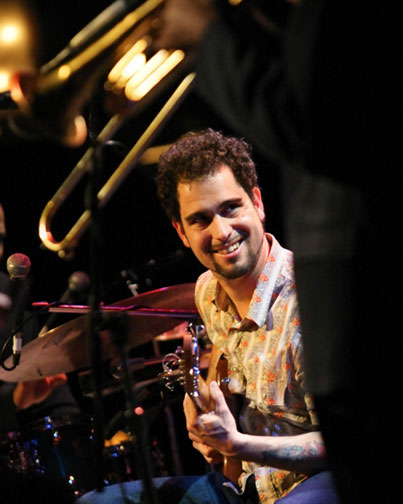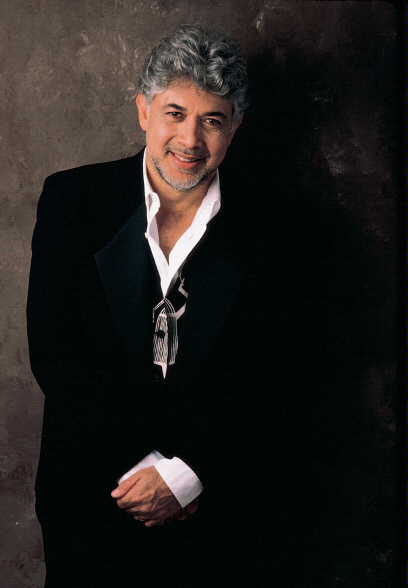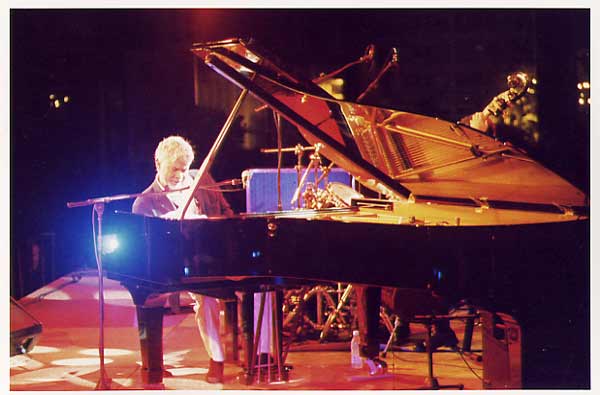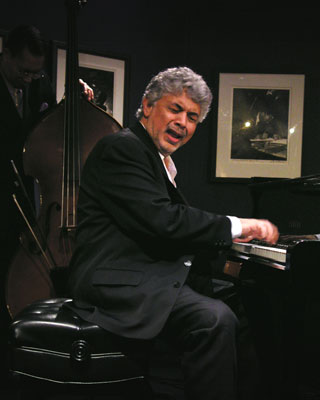CHARLIE HUNTER QUARTET / “Them Belly Full”
If the only thing you know about Charlie Hunter’s music is that he’s a guitarist, you might be wondering why nearly every song on this album features that weird-sounding organ more than any other instrument. It’s because the organ isn’t an organ, it’s Hunter’s guitar. Hunter plays a custom-made eight-string guitar that allows him to play both guitar notes and bass notes at the same time, and, Hunter uses unusual amps to give his guitar that fat, rolled-off sound that most listeners associate with gospel churches or classic R&B – the Hammond B3 organ.
 More impressive than Hunter’s unusual guitar sound and playing technique is his ability as an arranger and an interpreter. On this, the prolific guitarist’s fourth release (he’s up to nearly twenty albums now), Hunter redoes the entire Natty Dread album, which was Bob Marley’s first album without Peter Tosh and Bunny Wailer and a stone-cold classic of black music. Even to casual fans of reggae or Bob Marley, every song should be at least recognizable; the track listing almost reads like a greatest hits collection. But even given this daunting material to work with, Hunter never misses a step. Instead of playing the songs straight, he puts his stamp on each one, changing tempos, moods and structure.
Hunter treats Bob’s compositions as starting-off points, not as Holy Grail. Virtually none of the songs sound like a normal ‘cover.’ Meaning, even if you know all the words to these Bob Marley songs, you’ll have a hard time singing along to Charlie Hunter’s versions. In most cases, these simply aren’t the same songs.
“Them Belly Full” goes from a midtempo anthem to a scorching jam session with an Afro-Latin vibe. Ditto for “Bend Down Low,” which goes from easy and moody in its original form to fiery and dramatic at the hands of Hunter and his quartet. The anthemic “Lively Up Yourself” becomes a mid-tempo shuffle. Both “No Woman, No Cry” and “Rebel Music” are reshaped as a languorous blues ballads. The great “So Jah Seh” is made over so completely, that it’s barely recognizable. The title cut “Natty Dread” is just the opposite: very recognizable.
More impressive than Hunter’s unusual guitar sound and playing technique is his ability as an arranger and an interpreter. On this, the prolific guitarist’s fourth release (he’s up to nearly twenty albums now), Hunter redoes the entire Natty Dread album, which was Bob Marley’s first album without Peter Tosh and Bunny Wailer and a stone-cold classic of black music. Even to casual fans of reggae or Bob Marley, every song should be at least recognizable; the track listing almost reads like a greatest hits collection. But even given this daunting material to work with, Hunter never misses a step. Instead of playing the songs straight, he puts his stamp on each one, changing tempos, moods and structure.
Hunter treats Bob’s compositions as starting-off points, not as Holy Grail. Virtually none of the songs sound like a normal ‘cover.’ Meaning, even if you know all the words to these Bob Marley songs, you’ll have a hard time singing along to Charlie Hunter’s versions. In most cases, these simply aren’t the same songs.
“Them Belly Full” goes from a midtempo anthem to a scorching jam session with an Afro-Latin vibe. Ditto for “Bend Down Low,” which goes from easy and moody in its original form to fiery and dramatic at the hands of Hunter and his quartet. The anthemic “Lively Up Yourself” becomes a mid-tempo shuffle. Both “No Woman, No Cry” and “Rebel Music” are reshaped as a languorous blues ballads. The great “So Jah Seh” is made over so completely, that it’s barely recognizable. The title cut “Natty Dread” is just the opposite: very recognizable.
 Hunter’s rearrangement actually emphasizes the compositional aspects of the song more than the original does. After listening to Hunter’s version of “Natty Dread,” I found that I liked the original more than I used to. In fact, that’s one of the attributes of Hunter’s project as a whole: that his covers give you a new and different appreciation for Bob’s music as compositions, as opposed to as political statements or as extensions of Bob himself. Over the years, through no fault of his own, Bob Marley has become a casualty of what Living Colour called ‘the cult of personality.’ Listening to the Charlie Hunter Quartert’s re-imagining of the Natty Dread album helps us regain an appreciation for Bob Marley the musician.
—Mtume ya Salaam
Pop vs Jazz
There are differences—one major one being how melody and harmony are used, emphasized or minimized. The pop guys stick close to easy melodies. The average listener kind of always knows where they are in the song when a pop cat improvises because the melodic form is usually not altered, whereas the jazz cats most often improvise over the harmony, the changes, and generally make a bunch of changes (variations/alterations/substitutions) to the changes, often times with only a passing or even no reference whatsoever to the melody of the particular song; so if you’re listening for the melody, it’s easy to get lost because often for the aforementioned reasons there are no melodic signposts to mark where one is within the song structure.
Charlie Hunter is jazz pop. I hear what he’s doing and I hear that he’s technically adept but it’s just not that interesting to me as either pop or jazz. I think of Hunter's approach as instrumental pop rather than jazz per se.
Hunter’s rearrangement actually emphasizes the compositional aspects of the song more than the original does. After listening to Hunter’s version of “Natty Dread,” I found that I liked the original more than I used to. In fact, that’s one of the attributes of Hunter’s project as a whole: that his covers give you a new and different appreciation for Bob’s music as compositions, as opposed to as political statements or as extensions of Bob himself. Over the years, through no fault of his own, Bob Marley has become a casualty of what Living Colour called ‘the cult of personality.’ Listening to the Charlie Hunter Quartert’s re-imagining of the Natty Dread album helps us regain an appreciation for Bob Marley the musician.
—Mtume ya Salaam
Pop vs Jazz
There are differences—one major one being how melody and harmony are used, emphasized or minimized. The pop guys stick close to easy melodies. The average listener kind of always knows where they are in the song when a pop cat improvises because the melodic form is usually not altered, whereas the jazz cats most often improvise over the harmony, the changes, and generally make a bunch of changes (variations/alterations/substitutions) to the changes, often times with only a passing or even no reference whatsoever to the melody of the particular song; so if you’re listening for the melody, it’s easy to get lost because often for the aforementioned reasons there are no melodic signposts to mark where one is within the song structure.
Charlie Hunter is jazz pop. I hear what he’s doing and I hear that he’s technically adept but it’s just not that interesting to me as either pop or jazz. I think of Hunter's approach as instrumental pop rather than jazz per se.
 Now check Jamaican-born pianist Monty Alexander from his album Stir It Up – The Music of Bob Marley. Alexander be wandering all up, down, around, across, roundabout, thru and thru the song, figuring out how to lay different layers atop one another. A tapestry of sound. Patch quilting the harmonies.
Hunter’s and Alexander’s versions of “No Woman No Cry” are right next to each other in the jukebox. Regardless of which one you prefer, I think it will be easy to hear the substantial harmonic differences, some of them subtle, some of them as obvious as Bush lying about why we’re in Iraq and when the troops are coming home.
Hunter starts off quoting “Tennessee Waltz” but then sticks close to the basic melody after he introduces the theme. Once he hits his groove, Hunter basically stays there, sort of like driving through Kansas, it’s flat and straight. For his turn Monty chooses to cut across the mountains.
Now check Jamaican-born pianist Monty Alexander from his album Stir It Up – The Music of Bob Marley. Alexander be wandering all up, down, around, across, roundabout, thru and thru the song, figuring out how to lay different layers atop one another. A tapestry of sound. Patch quilting the harmonies.
Hunter’s and Alexander’s versions of “No Woman No Cry” are right next to each other in the jukebox. Regardless of which one you prefer, I think it will be easy to hear the substantial harmonic differences, some of them subtle, some of them as obvious as Bush lying about why we’re in Iraq and when the troops are coming home.
Hunter starts off quoting “Tennessee Waltz” but then sticks close to the basic melody after he introduces the theme. Once he hits his groove, Hunter basically stays there, sort of like driving through Kansas, it’s flat and straight. For his turn Monty chooses to cut across the mountains.
 After Alexander states the theme, they shift into a double-rhythm, the jazz drummer Troy Davis doing a 4/4 swing, the bass playing on the accents. Then on the “everything’s going to be alright” hook the band slips into a modified reggae skank. Then it’s back to one drop for the next verse statement. At the end of the song when you’re waiting for the last downbeat, Alexander offers modulations and leaves the downbeat unsounded. Obviously, this kind of improvisation appeals to me, whereas others might find that this sort of now-you-hear-it, now-you-don't bobbing and weaving is confounding, confusing or downright too hard to easily enjoy. This sound of surprising turns is precisely one of the essences of jazz.
On two of Alexander’s versions “Running Away” and “I Shot The Sheriff,” Monty Alexander features trombonist Steve Turre. (Turre also does conch shells on “Sheriff.”) Turre is right at home in this kitchen and sounds dancing-wonderful. It was a good call to bring Turre into the project.
After Alexander states the theme, they shift into a double-rhythm, the jazz drummer Troy Davis doing a 4/4 swing, the bass playing on the accents. Then on the “everything’s going to be alright” hook the band slips into a modified reggae skank. Then it’s back to one drop for the next verse statement. At the end of the song when you’re waiting for the last downbeat, Alexander offers modulations and leaves the downbeat unsounded. Obviously, this kind of improvisation appeals to me, whereas others might find that this sort of now-you-hear-it, now-you-don't bobbing and weaving is confounding, confusing or downright too hard to easily enjoy. This sound of surprising turns is precisely one of the essences of jazz.
On two of Alexander’s versions “Running Away” and “I Shot The Sheriff,” Monty Alexander features trombonist Steve Turre. (Turre also does conch shells on “Sheriff.”) Turre is right at home in this kitchen and sounds dancing-wonderful. It was a good call to bring Turre into the project.
 Monty’s major achievement is not simply the elegant jazzing of Bob Marley’s reggae compositions but instead, somehow, Monty manages to make this mash up sound easy and refreshing as the cool runnings of a flowing Blue Mountain stream. With Monty at the wheel, the band brilliantly switchs back and forth between jazz rhythms and Jamaican rhythms with the thrilling and joyful ease of an expensive sports car negotiating a hairpin curve. If, like I do, you love jazz and also love Bob Marley, then Alexander’s Stir It Up is the set for you.
—Kalamu ya Salaam
P.S. I don't know why I didn't immediately identify what Charlie Hunter was doing, but anyway this set is obviously an emulation of the Blue Note so-called "soul jazz" style (so obvious that I didn't pick it up at first). I never was a big fan of that style even though I understood it and understood why people liked it. Part of the popularity of that style was a reaction and recoiling away from the style of jazz I was deeply into: that wild, free jazz stuff. Ya know, Coltrane, Pharoah, Sun Ra, Archie Sheep, etc. etc. etc.
The soul jazz folk had two strong suits. One, they kept it funky. Two, they kept it melodic. Easy to dance to. Easy to follow. Think/remember/check out the likes of Lou Donaldson, Johnny Hammond, John Patton, etc. They also had some hip, hip cover shots of fine Black women with afros. The Blue Note label had that corner on lock until the CTI label moved on the block and brought a little more sophistication to the neighborhood. In any case, that's the template for what Charlie Hunter is doing and as such I didn't then and don't now find it interesting. If I want funk I go to the sources. If I want jazz, I want a deeper cut.
It's sort of reason number two of why your lover leaves you: "it's me, not you." It's Kalamu's taste, not Charlie's playing.
And in case you're wondering, reason number one is (or a variation of): "it's you with your ______" (here you insert the appropriate invective, e.g. "trifling ass," or "cheatin' and lyin'," or "laying around not working," etc. etc.,); none of which is appropriate to this discussion about Charlie Hunter's album. But then again, Monty Alexander is one of them smooth, Caribbean dudes who is both playful and deep. Who can resist that? Plus he got that rugged, handsome, playboy look.
Right now, somebody is wondering what the hell is Kalamu talking about? What does that B.S. have to do with the music? To which I will simply reply: you'd be surprised at all the stuff that is up in the music. Not everybody in the audience is buying a ticket because they just love the music. Of course, there are also people like Kalamu, who ain't going to make the scene if he's not interested in the music regardless of what the musicians look like, play like, how popular they are, etc. etc. Ok, I'm out.
Just music
Hmm. There's a mouthful. I think we had this discussion before. I'm talking about back when me, Kalamu and Aumra argued about Bob James' "Nautilus." ...
WHOO-AHH!! Excuse me, but I'm listening to the Monty Alexander right now and “Running Away” just dropped. Now, there is a cover worth listening to! Wow. ...
Anyway, Kalamu's and Aumra's argument boiled down to this: Bob James isn't real jazz. My retort boiled down to: I don't care. I wasn't so much arguing that Bob James is a real jazz musician in the way that Trane or Bird or even Wynton is, I was arguing that I like the record and therefore, I don't really care if it's 'real' or not.
Seems to me, we're having the same conversation here. Charlie Hunter isn't a 'real' jazz musician. He's either: a) a pop-jazz musician, or b) a soul-jazz musician. You won't get any argument from me about either of those. In fact, as I told Kalamu, I didn't even occur to me that Charlie Hunter was supposed to be playing jazz. (Meaning, I didn't know that his or his record label's intention was to put him out there as a jazz musician. Sure, he's on Blue Note, but they've long since branched off into non-jazz projects.) I just thought of it as some very nice instrumental versions of Bob Marley songs.
Of course, given that I have no personal investment in jazz—the real variety or the fake kind—I can afford to have a laissez-faire attitude about the subject. I didn't grow up with the music. Trane was never my hero. I like Miles a lot, but it's not a deeply personal thing. When I hear someone playing a lighter, simpler style of jazz, I just hear music. Either I like it or I don't and I keep on rolling. In deciding whether or not I like it, I don't factor in whether it's light or heavy, simple or complicated. In fact, unless I'm having a conversation like this, it doesn't even occur to me.
Now, talk about something I did grow up with, start talking about hip-hop, and I'd probably change my tune. Let Kalamu post some phony-ass, no-flowing, wooden-rhyming supposed-to-be MC and I'll probably go off like
Monty’s major achievement is not simply the elegant jazzing of Bob Marley’s reggae compositions but instead, somehow, Monty manages to make this mash up sound easy and refreshing as the cool runnings of a flowing Blue Mountain stream. With Monty at the wheel, the band brilliantly switchs back and forth between jazz rhythms and Jamaican rhythms with the thrilling and joyful ease of an expensive sports car negotiating a hairpin curve. If, like I do, you love jazz and also love Bob Marley, then Alexander’s Stir It Up is the set for you.
—Kalamu ya Salaam
P.S. I don't know why I didn't immediately identify what Charlie Hunter was doing, but anyway this set is obviously an emulation of the Blue Note so-called "soul jazz" style (so obvious that I didn't pick it up at first). I never was a big fan of that style even though I understood it and understood why people liked it. Part of the popularity of that style was a reaction and recoiling away from the style of jazz I was deeply into: that wild, free jazz stuff. Ya know, Coltrane, Pharoah, Sun Ra, Archie Sheep, etc. etc. etc.
The soul jazz folk had two strong suits. One, they kept it funky. Two, they kept it melodic. Easy to dance to. Easy to follow. Think/remember/check out the likes of Lou Donaldson, Johnny Hammond, John Patton, etc. They also had some hip, hip cover shots of fine Black women with afros. The Blue Note label had that corner on lock until the CTI label moved on the block and brought a little more sophistication to the neighborhood. In any case, that's the template for what Charlie Hunter is doing and as such I didn't then and don't now find it interesting. If I want funk I go to the sources. If I want jazz, I want a deeper cut.
It's sort of reason number two of why your lover leaves you: "it's me, not you." It's Kalamu's taste, not Charlie's playing.
And in case you're wondering, reason number one is (or a variation of): "it's you with your ______" (here you insert the appropriate invective, e.g. "trifling ass," or "cheatin' and lyin'," or "laying around not working," etc. etc.,); none of which is appropriate to this discussion about Charlie Hunter's album. But then again, Monty Alexander is one of them smooth, Caribbean dudes who is both playful and deep. Who can resist that? Plus he got that rugged, handsome, playboy look.
Right now, somebody is wondering what the hell is Kalamu talking about? What does that B.S. have to do with the music? To which I will simply reply: you'd be surprised at all the stuff that is up in the music. Not everybody in the audience is buying a ticket because they just love the music. Of course, there are also people like Kalamu, who ain't going to make the scene if he's not interested in the music regardless of what the musicians look like, play like, how popular they are, etc. etc. Ok, I'm out.
Just music
Hmm. There's a mouthful. I think we had this discussion before. I'm talking about back when me, Kalamu and Aumra argued about Bob James' "Nautilus." ...
WHOO-AHH!! Excuse me, but I'm listening to the Monty Alexander right now and “Running Away” just dropped. Now, there is a cover worth listening to! Wow. ...
Anyway, Kalamu's and Aumra's argument boiled down to this: Bob James isn't real jazz. My retort boiled down to: I don't care. I wasn't so much arguing that Bob James is a real jazz musician in the way that Trane or Bird or even Wynton is, I was arguing that I like the record and therefore, I don't really care if it's 'real' or not.
Seems to me, we're having the same conversation here. Charlie Hunter isn't a 'real' jazz musician. He's either: a) a pop-jazz musician, or b) a soul-jazz musician. You won't get any argument from me about either of those. In fact, as I told Kalamu, I didn't even occur to me that Charlie Hunter was supposed to be playing jazz. (Meaning, I didn't know that his or his record label's intention was to put him out there as a jazz musician. Sure, he's on Blue Note, but they've long since branched off into non-jazz projects.) I just thought of it as some very nice instrumental versions of Bob Marley songs.
Of course, given that I have no personal investment in jazz—the real variety or the fake kind—I can afford to have a laissez-faire attitude about the subject. I didn't grow up with the music. Trane was never my hero. I like Miles a lot, but it's not a deeply personal thing. When I hear someone playing a lighter, simpler style of jazz, I just hear music. Either I like it or I don't and I keep on rolling. In deciding whether or not I like it, I don't factor in whether it's light or heavy, simple or complicated. In fact, unless I'm having a conversation like this, it doesn't even occur to me.
Now, talk about something I did grow up with, start talking about hip-hop, and I'd probably change my tune. Let Kalamu post some phony-ass, no-flowing, wooden-rhyming supposed-to-be MC and I'll probably go off like  .
.
* * *
Now, on to Monty Alexander. I love this stuff. “Running Away” is incredible. It rivals the original, and the original is one of my favorite Bob Marley songs. “No Woman, No Cry” and “Jammin'” are very hip too. I don't like “I Shot The Sheriff.” It's too happy and bouncy-sounding and the tempo is way too fast. That's a heavy, serious song. The bright, shiny 'Smile Jamaica' treatment just isn't working. Do I hear the differences that Kalamu's talking about? (Between Charlie Hunter's style and Monty Alexander's.) Yes, I do. He described it accurately. The way I hear it, Charlie's changes are in style. He re-arranged the songs so that they had different moods or tempos or so that sound as if they're a different genre of music. Monty's changes, as Kalamu says, are structural. He plays the head of the song 'straight,' but then goes into his own thing, using just the basic framework of the song to improvise freely. I like it. Hell, I like it a lot. My thing is, I like both. I like what Charlie Hunter is doing and I like what Monty Alexander is doing. I could listen to them both all day and back-to-back and it wouldn't bother me a bit. I'd never really notice or care that one is harmonically complex while the other is very straight-forward and 'easy.' Then again, like I said, I don't have a personal investment. To me, it's just music. —Mtume ya SalaamThis entry was posted on Sunday, February 4th, 2007 at 12:43 am and is filed under Cover. You can follow any responses to this entry through the RSS 2.0 feed. You can leave a response, or trackback from your own site.
2 Responses to “CHARLIE HUNTER QUARTET / “Them Belly Full””
February 4th, 2007 at 1:43 am
Mtume, I couldn’t agree more – love them both. I always like seeing Hunter live – he has got groove, flow and the arrangements can make you think differently about a piece of music. I do dig the soul/jazz sound, but it doesn’t stop me from getting into Trane, Pharaoh, etc – depends on my mood. Monty also toured a few years back with another Jamaican legend who is a bit of hero of mine – the guitarist Ernie Ranglin. I wonder where his style of playing fits into this argument…
February 5th, 2007 at 8:26 am
Charlie Hunter came on my radar because of his association with Michael Franti (in the Disposable Heroes of hiphoprisy). That makes me a long-time fan, I think. At any rate, his range is amazing, and he sounds at home in ever genre he touches. Masterful.
Leave a Reply
| top |